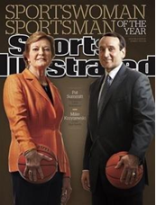“Sports do not build character. They reveal it.” –Heywood Brown, American journalist
I’ve been watching a lot of high school baseball recently. I have a nephew whose team is in the state high school tournaments—and, at least as of this blog post, they are continuing to win and make their way to the state finals.
As I’ve been enjoying the “national past time,” I’ve been paying a lot of attention to leadership. Leadership in baseball (as in organizations) happens at all levels. You can learn a lot by observing leaders in action—both in and outside of organizational life. And, in baseball, as in organizations, you can observe leadership in action on a regular basis (and you also notice the implications of a lack of leadership). Here’s what I’ve noticed:

 If you like college basketball, the names Coach K (Duke Blue Devils) and Pat Summit (Tennessee Lady Volunteers) are familiar. They are the two winningest coaches in Division I college basketball history. Both were honored by Sports Illustrated as the Sportsman and Sportswoman of the year in 2011. You may (or may not) be a fan of their respective teams; either way, you can’t argue with their success.
If you like college basketball, the names Coach K (Duke Blue Devils) and Pat Summit (Tennessee Lady Volunteers) are familiar. They are the two winningest coaches in Division I college basketball history. Both were honored by Sports Illustrated as the Sportsman and Sportswoman of the year in 2011. You may (or may not) be a fan of their respective teams; either way, you can’t argue with their success.



